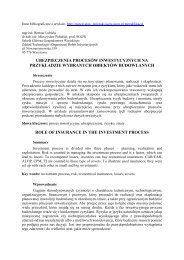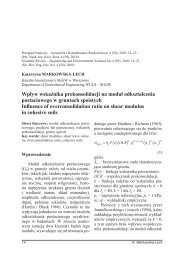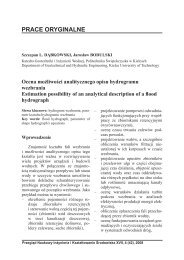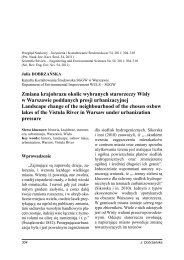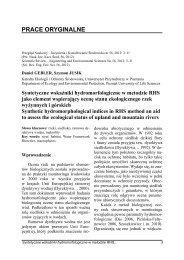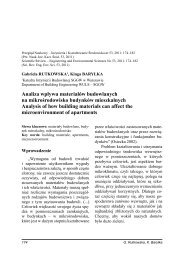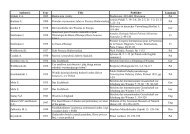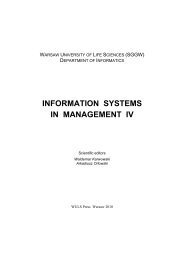ACTA SCIENTIARUM POLONORUM - SGGW
ACTA SCIENTIARUM POLONORUM - SGGW
ACTA SCIENTIARUM POLONORUM - SGGW
Create successful ePaper yourself
Turn your PDF publications into a flip-book with our unique Google optimized e-Paper software.
60 L. Mazal, K.J. RowlesThe most important of the ‘schools of thought’ associated with the rules approach wasthe Monetarist. The monetarists rejected the idea that there was a stable and predictablechoice between unemployment and inflation. At best, only a short-run trade-off existedand governments attempting to pursue employment targets would fail in the long-run, andonly boost the level of inflation. Thus, the effects of discretionary demand managementwere reduced to impotency in the long-run and macro-policy should be properly confinedto ensuring low inflation by control of the money supply. The adaptive expectations modelmeant that there was a possibility of demand-management policies in the short-run, butin the long-run the resulting inflation would necessitate higher levels of unemploymentand lower output. In terms of economic stability, government intervention would proveto have the opposite outcomes from those intended. The New Classical version of monetarismwent even further by denying that real variables such as output and employmentcould be influenced by systematic demand-management policies in either the short-runor long-run. There is no trade-off between unemployment and inflation. The only Phillipscurve is a vertical relationship at the natural rate of unemployment. This notion isbased on ‘rational expectations’ whereby economic agents acting in their self-interest willmodify their behaviour in line with expectations based on the most up-to date informationavailable. Economic agents (workers) do not suffer from money illusion, because ifgovernment attempt to expand demand in order to stimulate output and employment thisis fully anticipated by decision makers. Behaviour is modified to offset the interventionof the authorities and there will be no effect on the real variables in the economy even inthe short-run. If price expectations no longer lag behind inflation, which is crucial to understandingthe Phillips Curve trade-off, there is no possibility of moving variables fromtheir natural levels. Rational expectations theory was originally developed by J.F. Muthin 1961, but its application to macroeconomics was made by Lucas in 1972. Expectationswhich economic agents form about the variables in which they are interested such as therate of inflation will reflect the efficient use of publicly available information such as therate of monetary expansion. Agents will form expectations, which will not be systematicallywrong over time. One average, expectations will be correct. Such expectations willbe rational because the best use is made of the available information. It is not claimedthat economic decision-makers all have direct information about the causation process ofinflation, but it is argued that it will be possible to utilise such information and that marketpressures and information indirectly acquired, such as through the media, with leadeconomic agents to rational decision-making.Rational theory implies that unemployment cannot depart from the natural level inany persisting fashion. Employment will deviate from the natural rate as the result ofrandom and unpredictable shocks to aggregate demand and supply. However, subsequentchanges in behaviour will restore equilibrium and there is certainly no available short-runPhillips curve available to the authorities. Indeed the actions of the policy makers to influenceoutput and employment will cause shocks to the system. As Artis and others argued,the prescription for stability in the economy is not to manipulate demand as the post-warKeynesians had claimed, but rather to adopt a rule (growth of the money supply) and stickto it without deviation. Fiscal policy became associated with supply-side policies to raisethe trend rate of growth. Thus, the role of markets would be enhanced because it is privateenterprise that creates growth and employment.Acta Sci. Pol.




